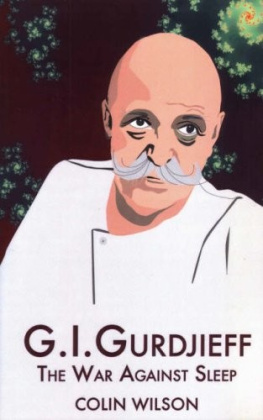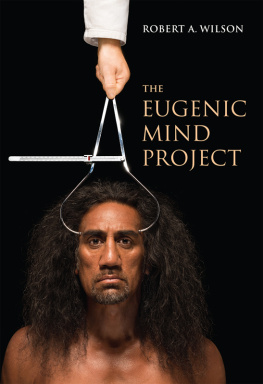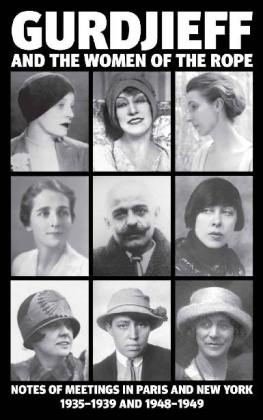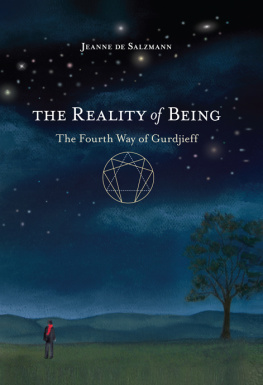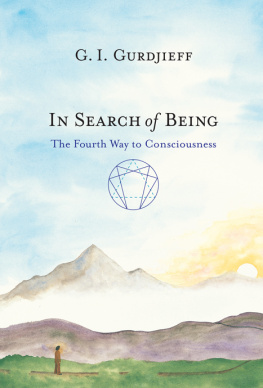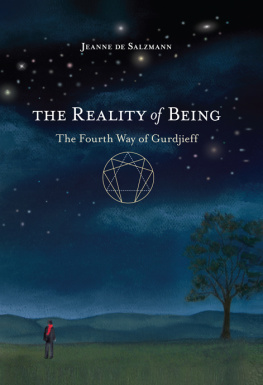The War Against Sleep
The Philosophy of Gurdjieff
by
COLIN WILSON
AQUARIAN
THE AQUARIAN PRESS LIMITED
Wellingborough, Northamptonshire
For Cyril Tilburn, whose help was invaluable.
Acknowledgements
I wish to acknowledge the kindness of Messrs Routledge and Kegan Paul for permission to quote from the works of Gurdjieff and Ouspensky. I also wish to thank Turnstone Press Ltd. for allowing me to quote from John Bennetts Witness and Gurdjieff: Making a New World. I also wish to thank Victor Gollancz Ltd. for permission to quote from Fritz Peterss Boyhood with Gurdjieff.
Introductory Note
It was in 1951, a year after the publication of In Search of the Miraculous and Beelzebubs Tales to His Grandson, that I first came across the ideas of Gurdjieff. I was instantly aware of being in touch with one of the great minds of this century. I wrote about him for the first time in 1955, in the concluding chapter of The Outsider, where he figures (with Ramakrishna and T.E. Hulme) as one of the few men who have glimpsed a solution to the sickness of man in the twentieth century. Since then I have written about him in several booksnotably The Occult and Mysteries.
When the publishers of the present book suggested that I should write about Gurdjieff, I experienced misgivings; it would involve repeating a great deal that I have already written. But then, my own views on Gurdjieff have changed and evolved over the years, and the idea of getting them between two covers was an interesting challenge. So I brushed aside my doubts, decided to repeat myself where necessary, and wrote the book. And in repeating myself I discovered an entirely new set of meanings and implications in Gurdjieff.
It was an interesting lesson in the difference between grasping and merely knowinga distinction that lies at the heart of Gurdjieffs thought.
Which is why I make no apology to those who have read me on Gurdjieff before. His ideas will bear repetition.
1The Magician
On a bright summer morning in 1917, an attractive Russian woman in her late twenties sat in Phillipovs cafe, in St Petersburgs Nevsky Prospect, waiting for the arrival of her friend Peter Demianovitch Ouspensky. Uncharacteristically, Ouspensky was late. When he finally hurried in, he was in a state of unusual excitement. His first words were: I think this time weve really found what we need. And he reminded her that in Moscow, in 1915, he had met a remarkable teacher, who spoke of the fundamental problems of human existence with an air of knowledge and authority. His name was George Ivanovitch Gurdjieff. Now, said Ouspensky, Gurdjieff had come to St Petersburgand was, at that very moment, waiting for them in another branch of Phillipovs across the road. The lady, Anna Butkovsky, says:
When I entered the other Phillipovs I saw a man sitting at a table in the far corner, wearing an ordinary black coat and the high astrakhan cap that Russian men wear in winter. Signs of Greek ancestry could be discerned in his fine, virile features and in the look that pierced right through you (though not in an unpleasant way). He had an oval-shaped head, black eyes and an olive complexion, and wore a black moustache. His manner was very calm and relaxed, and he spoke without any gesticulation. Even to be sitting with him was very agreeable. Though it was not his native language, he could speak Russian fluently, in a manner not quite like ours, more exact and very picturesque. Sometimes he would speak in a lazy voice, and you felt that each phrase was being carefully and specially put together, for that particular occasion, not at all like the ready-made phrases which we would normally use in conversation, devoid of creative power or individuality. You quickly grasped that he had a gift of assembling words expressively. And here I sat, and I felt that I was at last in the presence of a Guru.
Gurdjieff made the same kind of impression on everyone who met him. We have, perhaps, a dozen records by pupils describing their first meeting. Almost without exception, they mention that look that pierced right through you. A young army officer named Thomas de Hartmann met Gurdjieff at about the same time. When two men wearing black coats and black moustaches approached him in the cafe, he wondered which was Gurdjieff. But my uncertainty was quickly dispelled by the eyes of one of the men. J.G. Bennett, who met Gurdjieff in Constantinople in 1920, wrote: I met the strangest pair of eyes I have ever seen. The two eyes were so different that I wondered if the light had played some trick on me. And all these different impressions are summarized in a remark made by the wife of the physician Kenneth Walker after she met Gurdjieff in Paris in 1948: The chief impression he gave me was the impression of immense vigour and of concentrated strength. I had the feeling that he was not really a man but a magician.
Gurdjieff was, in fact, a kind of magician. There can be no doubt that he possessed certain magical or psychic powers. But he seems to have regarded these as irrelevant or unimportant. Gurdjieffs central concern was with the potentialities of human beingsor, more specifically, of human consciousness. Ouspensky expressed it clearly in a little book called The Psychology of Mans Possible Evolution, where he remarks that ordinary psychology is concerned with man as he actually exists. But there is another kind, that studies man not from the point of view of what he is, or what he seems to be, but from the point of view of what he may become; that is, from the point of view of his possible evolution.
Expressed in this way, the idea sounds vague and general. But Gurdjieffs approach was precise and particular. The writings of his pupilsor disciplescontains many accounts of the operation of his own remarkable powers. Fritz Peters, an American who had known Gurdjieff since childhood, describes what happened when he visited Gurdjieff in Paris immediately after the Second World War. His war experiences had brought Peters to the verge of a nervous breakdown. The moment Gurdjieff saw him, he realized that he was sick.
When we reached his apartment, he led me down a long hall to a dark bedroom, indicated the bed, told me to lie down, and said: This is your room, for as long as you need it. I laid down on the bed and he left the room but did not close the door. I felt such enormous relief and such excitement at seeing him that I began to cry uncontrollably and then my head began to pound. I could not rest and got up and walked to the kitchen where I found him sitting at the table. He looked alarmed when he saw me, and asked me what was wrong. I said I needed some aspirin or something for my headache, but he shook his head, stood up, and pointed to the other chair by the kitchen table. No medicine, he said firmly. I give you coffee. Drink as hot as you can. I sat at the table while he heated the coffee and then served it to me. He then walked across the small room to stand in front of the refrigerator and watch me. I could not take my eyes off him and realized that he looked incredibly wearyI have never seen anyone look so tired. I remember being slumped over the table, sipping at my coffee, when I began to feel a strange uprising of energy within myselfI stared at him, automatically straightened up, and it was as if a violent electric blue light emanated from him and entered into me. As this happened, I could feel the tiredness drain out of me, but at the same moment his body slumped and his face turned grey as if it was being drained of life. I looked at him, amazed, and when he saw me sitting erect, smiling and full of energy, he said quickly: You all right nowwatch food on stoveI must go. There was something very urgent in his voice and I leaped to my feet to help him but he waved me away and limped slowly out of the room.

